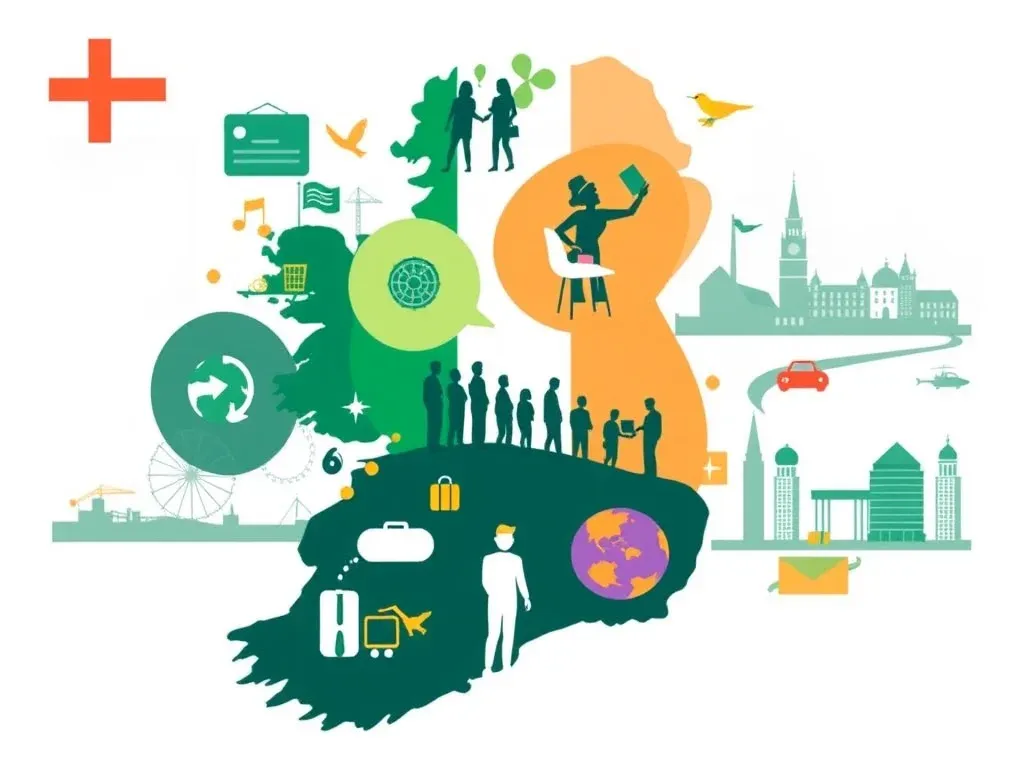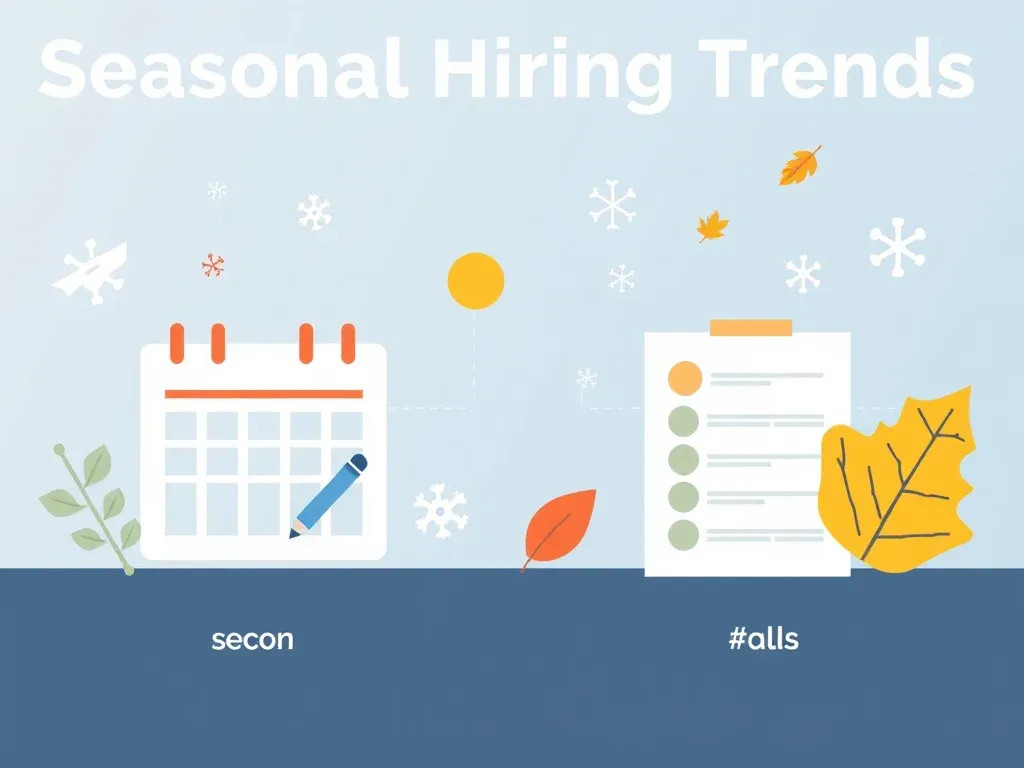Table of Contents
- Table of Contents
- Introduction
- Adaptation Strategies for International Professionals
- Before Arrival
- First Three Months
- Long-term Integration
- Common Adjustment Challenges
- Key Characteristics of Irish Workplace Culture
- Relationship-Oriented Approach
- Balance of Formality and Informality
- Humor and Wit
- Modesty and Understatement
- Adaptability and Pragmatism
- Communication Styles and Practices
- Indirect Communication
- Storytelling and Narrative
- Email and Written Communication
- Verbal Communication Patterns
- Non-Verbal Communication
- Business Etiquette and Professional Norms
- Meeting Etiquette
- Dress Code
- Business Meals and Socializing
- Gift-Giving Practices
- Digital Etiquette
- Work Relationships and Social Dynamics
- Colleague Relationships
- Manager-Employee Dynamics
- Building Trust
- Networking Practices
- Management Styles and Hierarchy
- Prevalent Management Styles
- Organizational Hierarchy
- Delegation and Autonomy
- Expectations of Managers
- Work-Life Integration
- Traditional Perspectives
- Contemporary Practices
- Industry and Organizational Differences
- Social Aspects of Work
- Meetings and Decision-Making Processes
- Meeting Culture
- Decision-Making Approaches
- Meeting Preparation and Follow-Up
- Virtual and Hybrid Meetings
- Feedback and Conflict Resolution
- Feedback Styles
- Receiving Feedback
- Conflict Management
- Cultural Challenges
- Industry-Specific Cultural Variations
- Technology Sector
- Financial Services
- Pharmaceutical and Medical Devices
- Public Sector
- Traditional Industries
- Regional Differences in Workplace Culture
- Dublin
- Cork, Galway, and Limerick
- Smaller Towns and Rural Areas
- Border Regions
- Irish Workplace Culture in International Context
- Comparison with Anglo-American Cultures
- Comparison with Continental European Cultures
- Comparison with Asian Business Cultures
- Global Business Integration
- Adaptation Strategies for International Professionals
- Initial Observation Period
- Communication Adjustments
- Relationship Development
- Professional Integration
- Evolving Trends in Irish Workplace Culture
- Digital Transformation Impact
- Diversity and Inclusion
- Wellbeing and Mental Health
- Organizational Structures
- Conclusion
- Key Takeaways
- Related Posts
Workplace Culture in Ireland: Understanding and Adapting
Reading time: 15 minutes
Understanding workplace culture is essential for career success, particularly when working in a new country. This comprehensive guide explores the unique aspects of Irish workplace culture, from communication styles and business etiquette to social norms and professional expectations, helping both Irish nationals and international professionals navigate and thrive in Irish work environments.
Introduction
Workplace culture encompasses the values, traditions, behaviors, and social norms that characterize an organization or business environment. In Ireland, workplace culture reflects both the country’s rich cultural heritage and its modern, globalized economy, creating a unique professional environment that combines traditional Irish values with contemporary business practices.
For professionals new to Ireland—whether Irish nationals entering the workforce for the first time or international workers relocating to the country—understanding these cultural nuances can significantly impact career success, job satisfaction, and professional relationships. Similarly, for employers and managers, recognizing and effectively navigating Irish workplace culture is essential for building cohesive teams, fostering employee engagement, and creating productive work environments.
This guide explores the distinctive features of Irish workplace culture, offering insights and practical advice for successfully adapting to and thriving in Irish professional settings. By understanding the unwritten rules, communication patterns, and social expectations that shape workplace interactions in Ireland, both employees and employers can build stronger professional relationships and achieve greater success in their careers and organizations.
Pro Tip
When joining an Irish workplace, take time to observe the social dynamics before making assumptions about how things work. What might initially seem like casual conversation or socializing is often an important part of building professional relationships and trust in Irish business culture.
Adaptation Strategies for International Professionals
For professionals from other countries, adapting to Irish workplace culture requires intentional strategies and an open mindset.
Before Arrival
Preparation steps before relocating:
- Cultural Research: Study Irish business norms, history, and social customs
- Network Building: Connect with Irish professionals or expatriates online
- Language Nuances: Familiarize yourself with Irish English expressions and slang
- Industry Context: Research your specific sector’s culture in Ireland
- Expectation Setting: Prepare mentally for cultural adjustment challenges
First Three Months
Critical adaptation period strategies:
- Active Observation: Watch and learn from colleagues’ interactions
- Relationship Building: Accept social invitations and participate in team events
- Cultural Mentor: Find a colleague willing to explain unwritten rules
- Communication Adaptation: Adjust your style to match local expectations
- Feedback Seeking: Ask for guidance on cultural integration
Long-term Integration
Strategies for deeper cultural integration:
- Community Involvement: Participate in local activities beyond work
- Cultural Contribution: Share your own cultural perspectives appropriately
- Continuous Learning: Remain curious about cultural nuances
- Bicultural Competence: Develop ability to operate effectively in both cultures
- Mentoring Others: Help newer international colleagues adapt
Common Adjustment Challenges
Recognizing and addressing typical difficulties:
- Communication Misunderstandings: Strategies for clarifying indirect communication
- Social Integration: Overcoming barriers to building relationships
- Feedback Interpretation: Understanding the Irish approach to criticism
- Work-Life Boundaries: Navigating different expectations about separation
- Decision-Making Processes: Adapting to consensus-oriented approaches
Pro Tip
Cultural adaptation is a two-way process. While it’s important to understand and adapt to Irish workplace norms, also look for appropriate opportunities to share your own cultural perspectives and practices. Many Irish organizations value international viewpoints that can enhance innovation and problem-solving. The key is finding the right balance between adaptation and authentic cultural exchange.
Key Characteristics of Irish Workplace Culture
Irish workplace culture has several distinctive characteristics that set it apart from other countries, even those with seemingly similar business environments. Understanding these core elements provides a foundation for navigating professional life in Ireland.
Relationship-Oriented Approach
Irish business culture places significant emphasis on personal relationships and connections. This manifests in several ways:
- Trust Building: Business relationships in Ireland typically develop through personal connection before formal business arrangements
- Networking Importance: Who you know can be as important as what you know in many Irish professional contexts
- Long-term Perspective: Business relationships are often viewed as long-term commitments rather than transactional exchanges
- Personal Touch: Taking time to inquire about colleagues’ personal lives and sharing appropriate personal information is often expected
Balance of Formality and Informality
Irish workplace culture often strikes a distinctive balance between formal and informal approaches:
- First-Name Basis: Most Irish workplaces operate on a first-name basis, even with senior management
- Casual Communication: Informal language and humor are common, even in professional settings
- Situational Formality: Formality levels adjust based on context—more formal with clients, less so with colleagues
- Professional Boundaries: Despite the casual atmosphere, professional boundaries still exist and should be respected
Humor and Wit
Humor plays a significant role in Irish workplace culture:
- Social Lubricant: Humor often serves to ease tensions and build rapport
- Self-deprecation: Self-deprecating humor is common and often appreciated
- Slagging: Good-natured teasing (known as “slagging”) is a form of social bonding
- Indirect Communication: Humor sometimes serves as a vehicle for indirect feedback or criticism
Modesty and Understatement
Irish culture generally values modesty over self-promotion:
- Achievement Downplaying: Accomplishments are often downplayed rather than highlighted
- Tall Poppy Syndrome: Excessive self-promotion may be viewed negatively
- Team Recognition: Sharing credit and recognizing team contributions is highly valued
- Subtle Competence: Competence is often demonstrated through actions rather than words
Adaptability and Pragmatism
Irish workplace culture often demonstrates practical flexibility:
- Problem-Solving Focus: Emphasis on finding workable solutions rather than rigid adherence to processes
- Improvisation: Ability to adapt and improvise when faced with challenges
- Results Orientation: Focus on outcomes rather than strict adherence to methodology
- Flexibility: Willingness to adjust approaches based on changing circumstances
Pro Tip
In Irish workplaces, being able to take a joke (including at your own expense) is often viewed positively. However, it’s important to distinguish between good-natured “slagging” and inappropriate comments. If you’re unsure about the boundaries, observe how long-term employees interact before participating fully in this aspect of workplace culture.
Communication Styles and Practices
Communication in Irish workplaces has distinctive characteristics that reflect broader cultural values and can significantly impact professional interactions and relationships.
Indirect Communication
Irish communication often employs indirect approaches:
- Softened Criticism: Negative feedback is frequently cushioned with positive comments
- Suggestion Over Direction: Phrases like “You might consider…” rather than direct commands
- Reading Between Lines: Important messages may be conveyed subtly rather than explicitly
- Politeness Conventions: Direct refusals are often avoided in favor of softer alternatives
Storytelling and Narrative
The Irish tradition of storytelling influences workplace communication:
- Anecdotal Evidence: Personal stories and examples often used to illustrate points
- Context Building: Providing background and context rather than just facts
- Relationship Building: Sharing stories as a way to build connections
- Organizational Memory: Company history and culture often transmitted through stories
Email and Written Communication
Written communication in Irish workplaces often reflects the balance between formality and informality:
- Personalized Openings: Emails often begin with personal inquiries or comments
- Contextual Information: More background information may be included than in some other cultures
- Politeness Markers: Frequent use of “please,” “thank you,” and other courtesy phrases
- Humor Inclusion: Appropriate humor may appear even in formal written communication
Verbal Communication Patterns
Face-to-face and verbal communication has particular characteristics:
- Small Talk Importance: Business discussions often begin with personal conversation
- Interruption Patterns: Overlapping speech may be more common than in some cultures
- Enthusiasm Expression: Animated speech and expression when engaged
- Topic Transitions: Fluid movement between topics rather than linear progression
Non-Verbal Communication
Non-verbal cues play an important role in Irish workplace communication:
- Eye Contact: Direct but not sustained eye contact is typical
- Personal Space: Moderate personal space compared to other European cultures
- Handshakes: Firm handshakes are standard in professional settings
- Facial Expressions: Expressive faces that communicate reactions and emotions
Pro Tip
When communicating with Irish colleagues, pay attention to what isn’t explicitly said. If you receive a response like “That might be difficult” or “We’ll have to see about that,” it may actually be a polite way of saying “no.” Learning to interpret these subtle cues will help you navigate workplace interactions more effectively.
Business Etiquette and Professional Norms
Understanding the unwritten rules of business etiquette in Ireland is essential for building professional credibility and effective working relationships.
Meeting Etiquette
Irish business meetings have their own protocols:
- Punctuality: Being on time is expected, though there may be some flexibility
- Agenda Adherence: Agendas exist but discussions may flow more organically
- Introductory Chat: Meetings typically begin with social conversation
- Participation Patterns: More senior members may speak more, but input is generally welcomed
- Meeting After the Meeting: Important discussions sometimes continue informally after official end
Dress Code
Appropriate attire in Irish workplaces varies by industry and context:
- Industry Variation: More formal in finance, legal, and client-facing roles; more casual in tech and creative industries
- Smart Casual Trend: Increasing adoption of smart casual as standard in many workplaces
- Context Sensitivity: Expectations may change for client meetings, presentations, or special events
- Quality Over Formality: Well-maintained, quality clothing often valued over strict formality
Business Meals and Socializing
Dining and social events are important aspects of Irish business culture:
- Lunch Meetings: Common for business discussions in relaxed settings
- After-Work Socializing: Pub gatherings and team events are important for relationship building
- Hosting Etiquette: Host typically pays, though splitting bills is becoming more common
- Rounds System: In informal settings, buying drinks in “rounds” is common practice
- Non-Drinking Participation: Participation in social events valued even if not drinking alcohol
Gift-Giving Practices
Gift-giving in Irish business contexts follows certain conventions:
- Moderation: Gifts should be thoughtful but not extravagant
- Appropriate Occasions: Typically for significant business milestones or personal events
- Team Gifts: Group gifts for colleagues’ life events are common
- International Awareness: Sensitivity to cultural differences when giving gifts to international partners
Digital Etiquette
Professional behavior in digital communications:
- Response Times: Prompt email responses generally expected during business hours
- After-Hours Contact: Increasing respect for work-life boundaries in digital communication
- Video Call Etiquette: Similar formality to in-person meetings, with some flexibility
- Messaging Platforms: Often more casual than email, but still professional
Pro Tip
In Irish business culture, after-work socializing can be an important part of building professional relationships. If invited to join colleagues for drinks or social events, try to accept occasionally even if brief. If you don’t drink alcohol, that’s perfectly acceptable—simply order a non-alcoholic beverage and participate in the conversation. The social interaction, not the drinking itself, is what builds connections.
Work Relationships and Social Dynamics
The nature and development of professional relationships in Irish workplaces have distinctive characteristics that influence career progression and job satisfaction.
Colleague Relationships
Relationships between peers in Irish workplaces often feature:
- Friendly Professionalism: Warm, personable interactions within professional boundaries
- Mutual Support: Willingness to help colleagues and share knowledge
- Social Integration: Work relationships often extend to social contexts
- Humor as Bonding: Shared jokes and light-hearted interactions as relationship builders
Manager-Employee Dynamics
Hierarchical relationships in Irish organizations typically show:
- Approachable Authority: Managers generally accessible and open to discussion
- Informal Respect: Respect shown through competence and reliability rather than formality
- Coaching Approach: Developmental rather than purely directive management styles
- Contextual Formality: Relationship formality may increase in certain situations or industries
Building Trust
Trust development in Irish workplace relationships typically involves:
- Reliability: Consistently delivering on commitments
- Authenticity: Being genuine rather than overly polished
- Reciprocity: Mutual exchange of support and assistance
- Social Engagement: Participating appropriately in workplace social dynamics
- Discretion: Respecting confidentiality and avoiding office politics
Networking Practices
Professional networking in Ireland has particular characteristics:
- Relationship Before Transaction: Building genuine connection before business discussion
- Industry Communities: Strong sector-based networks and communities
- Informal Channels: Significant networking occurs in social and informal settings
- Introductions Value: Personal introductions carry substantial weight
- Regional Networks: Local business communities remain important despite globalization
Pro Tip
In Irish workplaces, showing interest in colleagues’ lives outside work—asking about weekend plans, remembering personal details they’ve shared, or acknowledging important events in their lives—helps build stronger professional relationships. This isn’t seen as intrusive but rather as a sign of genuine collegiality. However, maintain appropriate boundaries and follow others’ lead regarding what personal information is appropriate to discuss.
Management Styles and Hierarchy
Leadership approaches and organizational structures in Irish workplaces reflect both traditional values and modern business practices.
Prevalent Management Styles
Common leadership approaches in Irish organizations include:
- Consultative Leadership: Seeking input while maintaining decision authority
- Relationship-Oriented: Focus on building rapport and understanding team members
- Pragmatic Approach: Practical problem-solving rather than rigid adherence to theory
- Situational Flexibility: Adapting leadership style to circumstances and individuals
Organizational Hierarchy
Hierarchical structures in Irish workplaces typically feature:
- Moderate Power Distance: Less rigid hierarchies than some European counterparts
- Accessible Leadership: Senior managers generally approachable
- Informal Authority: Respect based on competence and character alongside position
- Industry Variation: More hierarchical in traditional sectors, flatter in technology and startups
Delegation and Autonomy
Task assignment and employee independence typically involve:
- Trust-Based Delegation: Assigning responsibility with appropriate authority
- Guided Autonomy: Freedom within defined parameters
- Available Support: Managers typically accessible for guidance when needed
- Results Focus: Emphasis on outcomes rather than micromanaging process
Expectations of Managers
Irish employees typically expect managers to:
- Provide Clear Direction: Setting understandable goals and expectations
- Offer Development: Supporting professional growth and learning
- Show Fairness: Treating team members equitably
- Demonstrate Competence: Having sufficient technical or domain knowledge
- Display Authenticity: Being genuine rather than adopting an artificial “management persona”
Pro Tip
If you’re managing a team in Ireland, balancing professionalism with approachability is key. Irish employees typically respond well to managers who can maintain appropriate authority while still being personable and authentic. Showing genuine interest in your team members as individuals, being willing to roll up your sleeves when needed, and maintaining a sense of humor can help build respect and loyalty.
Work-Life Integration
The relationship between professional and personal life in Irish workplace culture has distinctive characteristics and is evolving with changing social and technological factors.
Traditional Perspectives
Historical approaches to work-life balance in Ireland include:
- Family Emphasis: Traditional importance placed on family commitments
- Community Involvement: Participation in local community activities valued
- Defined Boundaries: Historically clearer separation between work and personal time
- Regional Variations: Different patterns in urban centers versus rural communities
Contemporary Practices
Current approaches to work-life integration show:
- Flexible Working: Increasing adoption of flexible hours and remote work options
- Digital Boundaries: Evolving expectations around after-hours availability
- Wellness Focus: Growing emphasis on employee wellbeing and mental health
- Parental Support: Expanding provisions for maternity, paternity, and parental leave
Industry and Organizational Differences
Work-life integration varies significantly across sectors:
- Technology Sector: Often leading with flexible policies but sometimes blurred boundaries
- Financial Services: Typically more demanding hours but increasing flexibility initiatives
- Public Sector: Generally more structured hours with established work-life provisions
- Multinational vs. Local: Variations between international corporations and indigenous companies
Social Aspects of Work
The integration of social elements in professional life includes:
- Team Activities: Organized social events and team-building
- Informal Gatherings: Spontaneous after-work socializing
- Celebration of Milestones: Recognition of personal and professional achievements
- Inclusion Considerations: Growing awareness of diverse needs in social activities
Pro Tip
When navigating work-life integration in Irish workplaces, observe the unwritten norms of your specific organization rather than making assumptions. While Irish culture generally values work-life balance, practices vary widely between companies. Pay attention to when colleagues actually leave (not just official hours), how they handle after-hours emails, and whether flexible working is genuinely embraced or merely tolerated. Align your approach with the actual culture while still maintaining your personal boundaries.
Meetings and Decision-Making Processes
How meetings are conducted and decisions are reached in Irish workplaces reflects broader cultural values and organizational practices.
Meeting Culture
Business meetings in Ireland typically feature:
- Relationship Building: Time allocated for social interaction and rapport building
- Flexible Structure: Agendas exist but discussions may flow more organically
- Story-Based Communication: Points often illustrated through examples and anecdotes
- Humor Integration: Light moments and jokes even in serious business discussions
- Variable Participation: Some participants may speak more than others
Decision-Making Approaches
Common decision-making patterns include:
- Consultative Process: Gathering input before decisions are made
- Relationship Influence: Established relationships may impact decision weight
- Pragmatic Considerations: Practical factors often prioritized over theoretical ideals
- Consensus Building: Effort to achieve broad agreement, particularly on significant decisions
- Hierarchical Elements: Final decisions often rest with senior leadership
Meeting Preparation and Follow-Up
Expectations around meeting logistics include:
- Advance Materials: Distribution of relevant information before meetings
- Punctuality Expectations: Generally expected to arrive on time
- Note-Taking Practices: Often designated note-takers for important points
- Action Item Assignment: Specific responsibilities typically allocated
- Follow-Up Communications: Summary emails or messages after significant meetings
Virtual and Hybrid Meetings
Remote and mixed-format meetings show:
- Adaptation of Social Elements: Efforts to maintain relationship aspects in virtual formats
- Technology Comfort: Generally good adaptation to digital meeting tools
- Inclusion Challenges: Awareness of potential disparities between in-person and remote participants
- Evolving Protocols: Developing norms around camera use, participation, and etiquette
Pro Tip
In Irish business meetings, don’t be surprised if the first 5-10 minutes involve casual conversation before addressing the agenda. This isn’t wasted time but an important relationship-building component. Similarly, decisions may not always be finalized in the formal meeting—pay attention to informal discussions afterward, as these can significantly influence outcomes. If you’re leading a meeting, allow time for this social element while still ensuring the meeting remains productive.
Feedback and Conflict Resolution
How feedback is delivered and conflicts are addressed in Irish workplaces reflects cultural values around communication, relationships, and harmony.
Feedback Styles
Feedback in Irish workplace culture typically features:
- Indirect Approach: Criticism often delivered through suggestion rather than direct statement
- Sandwich Method: Negative feedback cushioned between positive comments
- Humor as Buffer: Light-hearted delivery to soften critical messages
- Private Delivery: Preference for one-on-one feedback rather than public
- Contextual Sensitivity: Adaptation based on relationship and situation
Receiving Feedback
Cultural expectations when receiving feedback include:
- Active Listening: Demonstrating attention and consideration
- Modest Response: Avoiding excessive defensiveness or justification
- Appreciation Expression: Acknowledging the feedback, even if challenging
- Clarification Questions: Seeking to understand rather than debate
- Follow-Up Actions: Demonstrating consideration through subsequent behavior
Conflict Management
Approaches to workplace disagreements typically include:
- Harmony Preference: General desire to maintain positive relationships
- Private Resolution: Addressing issues directly with involved parties first
- Mediated Conversations: Involving neutral third parties when necessary
- Pragmatic Solutions: Focus on workable outcomes rather than abstract principles
- Relationship Preservation: Emphasis on maintaining working relationships post-conflict
Cultural Challenges
Potential difficulties in feedback and conflict situations include:
- Interpretation Gaps: Indirect feedback may be missed or misunderstood
- Conflict Avoidance: Issues sometimes left unaddressed to maintain harmony
- Cross-Cultural Misalignment: Different expectations between Irish and international approaches
- Feedback Timing: Delayed feedback may reduce effectiveness
Pro Tip
When receiving feedback in an Irish workplace, listen for what might be implied rather than just what’s explicitly stated. Phrases like “You might want to consider…” or “Have you thought about…” often indicate areas for improvement rather than mere suggestions. Similarly, if you need to provide critical feedback, using questions and suggestions rather than direct statements (“I wonder if this approach might work better” versus “Your approach is wrong”) will typically be better received and more effective.
Industry-Specific Cultural Variations
Workplace culture in Ireland varies significantly across different industries, reflecting their unique histories, workforce compositions, and business requirements.
Technology Sector
Tech companies in Ireland typically feature:
- Casual Environment: Relaxed dress codes and informal communication
- Flexible Working: Greater adoption of remote and flexible arrangements
- International Influence: Multicultural teams and global practices
- Innovation Focus: Emphasis on creativity and new ideas
- Flatter Hierarchies: Less rigid organizational structures
Financial Services
Banking, insurance, and financial firms often show:
- Greater Formality: More formal dress codes and communication styles
- Structured Processes: Clearly defined procedures and protocols
- Regulatory Awareness: Strong compliance culture
- Traditional Hierarchies: More defined organizational levels
- Performance Metrics: Emphasis on measurable outcomes
Pharmaceutical and Medical Devices
Life sciences organizations typically feature:
- Quality Focus: Strong emphasis on precision and standards
- Scientific Communication: Data-driven discussions and decision-making
- Regulatory Compliance: Strict adherence to industry regulations
- Professional Development: Emphasis on continuous learning
- Global Integration: Connection to international operations and standards
Public Sector
Government and public service organizations often demonstrate:
- Procedural Emphasis: Adherence to established processes
- Service Orientation: Focus on public service values
- Structured Progression: Defined career paths and advancement
- Work-Life Balance: Generally more defined working hours
- Stakeholder Awareness: Consideration of broader public impact
Traditional Industries
Manufacturing, agriculture, and traditional sectors often show:
- Practical Focus: Emphasis on tangible results and experience
- Local Connections: Stronger ties to local communities
- Relationship Value: Importance of long-term business relationships
- Traditional Values: Greater emphasis on established practices
- Apprenticeship Culture: Learning through experience and mentorship
Pro Tip
When transitioning between industries in Ireland, take time to observe and adapt to the specific cultural norms of your new sector. What was appropriate in one industry may be viewed differently in another. For example, the direct communication style valued in technology startups might be considered too abrupt in more traditional sectors. Similarly, the formality expected in financial services might seem unnecessarily rigid in creative industries. Observe how colleagues interact, dress, and communicate before fully establishing your own approach.
Regional Differences in Workplace Culture
While Ireland is a relatively small country, workplace cultures can vary noticeably between different regions, reflecting local economic conditions, historical development patterns, and community characteristics.
Dublin
As the capital and largest city, Dublin’s workplace culture typically features:
- International Influence: Significant presence of multinational corporations
- Fast Pace: Generally quicker business tempo
- Competitive Environment: Higher levels of workplace competition
- Diverse Workforce: More multicultural and international teams
- Industry Clusters: Concentration of technology, financial services, and professional services
Cork, Galway, and Limerick
Ireland’s other major cities typically show:
- Balanced Approach: Mix of international influence and local character
- Specialized Sectors: Strong presence in specific industries (e.g., pharmaceuticals in Cork)
- Community Connection: Stronger ties to local community than in Dublin
- Work-Life Integration: Often more emphasis on lifestyle factors
- Growing Innovation: Expanding startup and technology ecosystems
Smaller Towns and Rural Areas
Workplace culture in smaller communities often features:
- Relationship Emphasis: Greater importance of personal connections
- Community Integration: Closer ties between businesses and local community
- Traditional Approaches: More conventional business practices
- Loyalty Value: Higher premium on employee retention and loyalty
- Local Knowledge: Importance of understanding local context and history
Border Regions
Areas near Northern Ireland may demonstrate:
- Cross-Border Awareness: Understanding of both Irish and UK business practices
- Adaptability: Experience navigating different regulatory environments
- Historical Sensitivity: Awareness of complex historical contexts
- Trade Focus: Emphasis on cross-border commercial relationships
Pro Tip
When relocating for work within Ireland, recognize that regional differences in workplace culture can be significant despite the country’s small size. In smaller towns and rural areas, taking time to build relationships and understand local contexts is particularly important for professional success. Conversely, in Dublin, adapting to a faster pace and more international environment may be necessary. Being aware of these regional variations can help you adjust your approach appropriately and integrate more effectively into your new workplace.
Irish Workplace Culture in International Context
Understanding how Irish workplace culture compares to other countries can help international professionals adapt more effectively and provide context for Irish professionals working with international colleagues or organizations.
Comparison with Anglo-American Cultures
Relative to the US, UK, and similar cultures:
- Relationship Emphasis: Greater focus on personal connections than in US business culture
- Communication Style: More indirect than US approaches but less formal than traditional British style
- Humor Integration: More prevalent use of humor in professional settings
- Competitive Dynamics: Generally less overtly competitive than US workplace cultures
- Work-Life Balance: Typically more emphasis on life outside work than in US corporate environments
Comparison with Continental European Cultures
Relative to mainland European approaches:
- Formality Level: Less formal than German or French business cultures
- Hierarchical Structure: Less rigid hierarchies than in many Southern European contexts
- Meeting Practices: More flexible and relationship-oriented than Northern European approaches
- Decision Processes: Less consensus-driven than Scandinavian models
- Time Orientation: More flexible approach to time than German or Swiss business cultures
Comparison with Asian Business Cultures
Relative to East Asian approaches:
- Directness Level: More direct than many East Asian communication styles
- Hierarchy Expression: Less visible hierarchical indicators than in many Asian contexts
- Relationship Building: Similar emphasis on relationships but developed through different practices
- Conflict Approach: More comfortable with constructive disagreement than some Asian cultures
- Group vs. Individual: More individualistic than many East Asian workplace cultures
Global Business Integration
Ireland’s position in international business:
- Multinational Adaptation: Experience integrating global corporate practices with local approaches
- Cultural Bridge: Often serves as a cultural and business bridge between US and European markets
- English Language Advantage: Native English facilitates international business relationships
- EU Membership: Alignment with European business standards and practices
- Global Outlook: Increasingly international perspective due to economic development patterns
Pro Tip
For international professionals adapting to Irish workplace culture, recognize that it often represents a middle ground between American directness and European formality. The Irish approach values relationships and personal connection while still maintaining a results-oriented focus. If you’re coming from a more direct culture (like the US), you may need to develop sensitivity to indirect communication cues. If you’re from a more formal business culture, you might need to adapt to Ireland’s more personable and flexible approach while still maintaining professional standards.
Adaptation Strategies for International Professionals
For professionals from other countries, adapting to Irish workplace culture requires understanding, flexibility, and strategic approaches to integration.
Initial Observation Period
Effective strategies during your first weeks include:
- Active Listening: Pay attention to communication patterns and unwritten rules
- Cultural Mentorship: Identify colleagues who can provide cultural guidance
- Contextual Questions: Ask about workplace norms and expectations
- Social Participation: Accept invitations to team lunches and gatherings
- Communication Adaptation: Notice and begin adapting to local communication styles
Communication Adjustments
Adapting your communication approach:
- Contextual Information: Provide more background in communications if from a direct culture
- Humor Integration: Gradually incorporate appropriate humor as comfortable
- Relationship Building: Allocate time for personal connection before business discussion
- Feedback Interpretation: Learn to recognize indirect feedback patterns
- Question Framing: Use open questions to gather information indirectly
Relationship Development
Building effective professional relationships:
- Social Engagement: Participate in team social activities when possible
- Interest Demonstration: Show genuine interest in colleagues’ perspectives
- Local Knowledge: Learn about Irish culture, history, and current events
- Reciprocity: Offer assistance and support to colleagues
- Cultural Exchange: Share appropriate aspects of your own culture
Professional Integration
Establishing yourself professionally:
- Competence Demonstration: Show expertise through actions rather than assertions
- Modesty Balance: Present accomplishments factually without overemphasis
- Team Orientation: Emphasize collaborative achievements
- Adaptability Display: Show willingness to learn local approaches
- Value Addition: Identify ways your different perspective adds value
Pro Tip
As an international professional in Ireland, your different perspective can be a significant asset when presented appropriately. Rather than immediately suggesting changes based on how things were done in your previous country, first take time to understand why current approaches exist. When you do share alternative perspectives, frame them as options to consider rather than corrections. This approach—”In my experience, another approach that might be interesting to consider is…”—is more likely to be well-received than direct criticism of existing methods.
Evolving Trends in Irish Workplace Culture
Irish workplace culture continues to evolve in response to global influences, technological changes, demographic shifts, and changing social values.
Digital Transformation Impact
Technology is reshaping workplace interactions:
- Remote Work Normalization: Increasing acceptance of distributed teams and flexible locations
- Digital Communication: Evolution of communication norms in virtual environments
- Work-Life Boundaries: Changing expectations around availability and response times
- Collaboration Tools: New platforms creating different interaction patterns
- Hybrid Models: Emerging practices combining in-person and remote work
Diversity and Inclusion
Growing emphasis on workplace diversity:
- Multicultural Workforces: Increasing international representation in Irish organizations
- Inclusion Practices: Greater focus on creating inclusive environments
- Cultural Awareness: Higher expectations for cross-cultural competence
- Generational Diversity: Adapting to different age groups’ working styles
- Accessibility Considerations: More attention to accommodating diverse needs
Wellbeing and Mental Health
Evolving approaches to employee wellbeing:
- Mental Health Awareness: Reduced stigma and increased support
- Wellbeing Programs: More comprehensive organizational initiatives
- Stress Management: Greater recognition of workplace stress factors
- Work-Life Integration: More sophisticated approaches to balance
- Leadership Responsibility: Increasing expectations for leaders to support wellbeing
Organizational Structures
Changing approaches to how work is organized:
- Flatter Hierarchies: Reduction in management layers in many organizations
- Project-Based Work: Increasing use of cross-functional teams
- Agile Methodologies: Adoption of more flexible work approaches
- Employee Autonomy: Greater emphasis on self-direction and ownership
- Collaborative Spaces: Office designs promoting interaction and innovation
Pro Tip
To stay current with evolving workplace culture in Ireland, regularly engage with diverse professional networks, attend industry events, and participate in cross-generational mentoring (both as mentor and mentee). These practices will help you understand emerging trends and expectations while building valuable relationships across different segments of the Irish professional community.
Conclusion
Understanding and adapting to Irish workplace culture is a journey that requires patience, curiosity, and flexibility. By recognizing the distinctive characteristics of Irish professional environments—from communication styles and relationship building to decision-making processes and work-life integration—both international and local professionals can navigate the workplace more effectively.
The Irish workplace continues to evolve, influenced by global trends, technological changes, and increasing diversity. This evolution creates both challenges and opportunities for professionals at all career stages.
Whether you’re new to Ireland or a long-term resident, developing cultural intelligence and adaptability will enhance your professional effectiveness and personal satisfaction in Irish workplaces.
Key Takeaways
- Irish workplace culture balances professionalism with personal connection and values both relationship building and task accomplishment
- Communication tends to be indirect and contextual, with humor playing an important role in workplace interactions
- Work-life integration is increasingly valued, with growing emphasis on wellbeing and flexibility
- Cultural adaptation requires intentional strategies before arrival, during initial adjustment, and for long-term integration
- Understanding industry variations and regional differences provides important context for workplace expectations
- The evolving nature of Irish workplace culture creates opportunities for positive contributions from diverse perspectives








